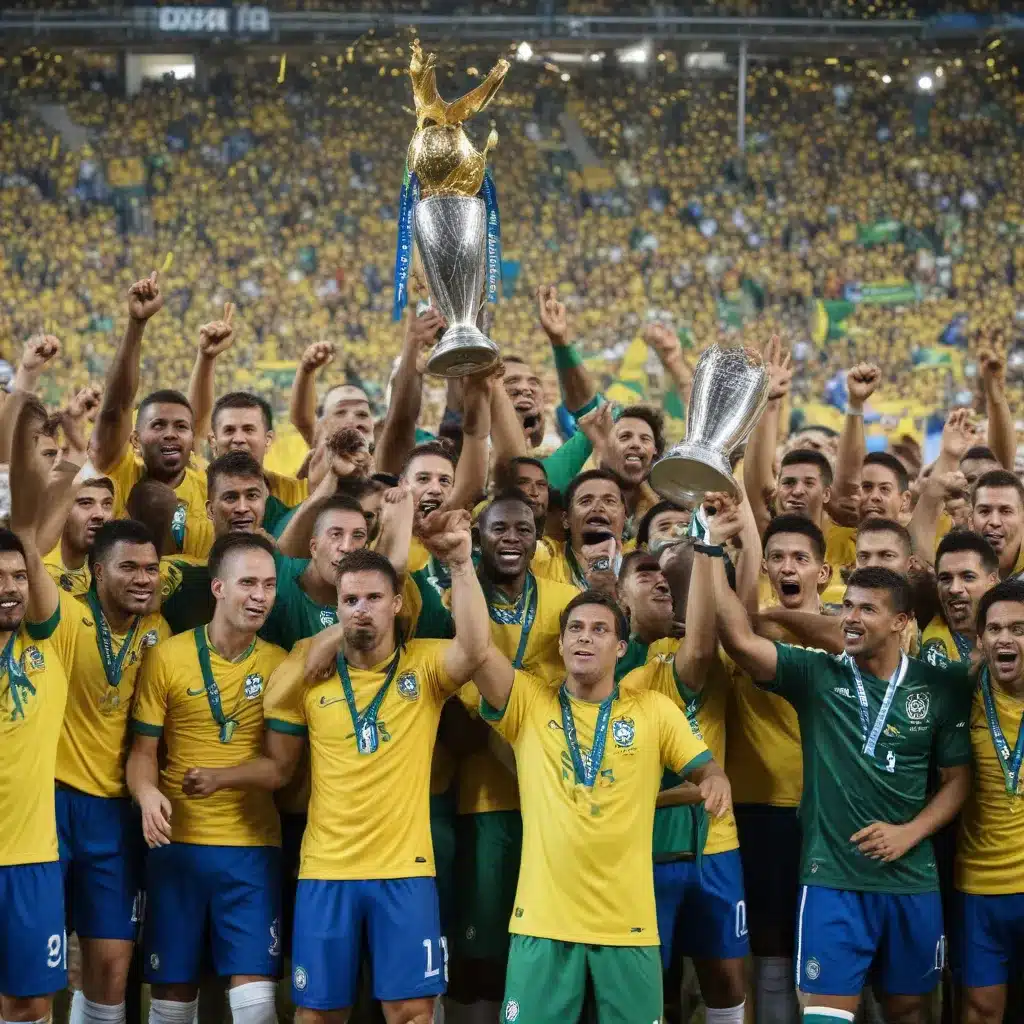
Brazilian Football Landscape
Brazil’s football landscape is a tapestry of rich history, iconic clubs, and passionate fan cultures. From the samba-infused possession game of Flamengo to the relentless counterattacking of Atlético Mineiro, the country’s top teams have developed distinctive tactical identities. As these clubs venture beyond Brazil’s borders, they must navigate the complexities of adapting their playing styles to succeed in global markets.
Club Structures
The Brazilian domestic league system, known as the Brasileirão, is a complex ecosystem with its own unique dynamics. Clubs operate under a range of ownership models, from traditional fan-owned structures to modern, investor-backed approaches. This diversity has fostered a variety of strategic priorities and tactical philosophies.
Many of Brazil’s top clubs, such as Flamengo and Corinthians, maintain a strong fan base and traditional ownership models. These clubs often prioritize maintaining a distinct playing identity, rooted in the country’s football heritage. In contrast, clubs like Atlético Mineiro and São Paulo have embraced more commercial, investor-driven approaches, seeking to leverage global opportunities while still preserving their core identity.
Club Internationalization Strategies
As Brazilian clubs expand their global reach, they must carefully balance their tactical identities with the demands of international markets. The pursuit of lucrative broadcasting deals, talent development, and brand recognition has led clubs to explore various internationalization strategies.
Global Expansion
Clubs like Flamengo and Corinthians have established international fan bases, leveraging their iconic status and storied histories to attract global audiences. These clubs often maintain their traditional playing styles, relying on the enduring appeal of the “Brazilian way” of football.
Talent Development
Other clubs, such as Atlético Mineiro and São Paulo, have focused on talent development, scouting, and transfer strategies to bolster their rosters with international stars. This approach allows them to adapt their tactics to suit the preferences of diverse global markets while still retaining their core playing identity.
Tactical Considerations
As Brazilian clubs venture into the international arena, they must navigate the nuances of adapting their tactical frameworks to new environments.
Tactical Frameworks
Possession-Based Approach
The possession-based game, exemplified by teams like Flamengo, has long been a hallmark of Brazilian football. These clubs prioritize technical quality, intricate passing, and fluid movement, often dominating the ball and tempo of the game.
Counterattacking Style
In contrast, clubs like Atlético Mineiro have embraced a more direct, counterattacking approach. These teams thrive on lightning-quick transitions, explosive pace, and clinical finishing, seeking to exploit space behind the opposition’s defensive line.
Adaptations for Global Markets
The tactical adjustments required for success in international competitions can be challenging for Brazilian clubs. They must balance the preservation of their distinctive playing styles with the need to adapt to the preferences and demands of diverse global audiences.
Stylistic Adjustments
Some clubs may tweak their tactical frameworks, incorporating elements from other successful international models to appeal to wider audiences. This could involve adjusting possession ratios, pressing intensity, or the balance between individual flair and collective organization.
Scouting and Recruitment
To succeed globally, Brazilian clubs have also refined their scouting and recruitment strategies. They seek to identify talented players whose skills and attributes align with the club’s tactical identity, while also considering the demands of international competitions.
Globalization Trends
The globalization of football has presented both opportunities and challenges for Brazilian clubs as they seek to expand their reach and compete on the world stage.
Market Opportunities
Emerging Economies
Emerging markets, such as Asia and Africa, have become increasingly important targets for Brazilian clubs. These regions offer significant potential for brand growth, broadcasting deals, and the development of new fan bases.
Broadcasting Deals
The lucrative global broadcasting landscape has become a key battleground for Brazilian clubs. Securing favorable television and streaming agreements in international markets can provide a crucial revenue stream to fund their global expansion.
Challenges and Limitations
Cultural Differences
Adapting to the cultural nuances of diverse global markets can be a significant challenge for Brazilian clubs. Understanding local fan preferences, media landscapes, and regulatory environments is crucial for successful internationalization.
Regulatory Barriers
Navigating the complex web of international regulations, transfer rules, and financial fair play policies can also pose obstacles for Brazilian clubs as they seek to expand their global footprint.
Lessons from Successful Clubs
Despite the challenges, some Brazilian clubs have found success in the international arena, serving as models for others seeking to emulate their strategies.
Case Studies
Flamengo
Flamengo’s global expansion has been driven by its iconic status and the enduring appeal of its possession-based, samba-infused playing style. The club has cultivated a strong international fan base, particularly in Asia, while maintaining its distinctive tactical identity.
Atlético Mineiro
Atlético Mineiro has taken a more commercially-driven approach, leveraging its counterattacking prowess and the star power of players like Hulk to attract global attention. The club has strategically scouted and recruited international talent to complement its tactical framework.
Key Factors for International Success
Brand Identity
Successful Brazilian clubs have often built their global expansion strategies around a strong, distinctive brand identity. This allows them to resonate with diverse audiences and stand out in a crowded international landscape.
Player Transfer Strategies
Effective player recruitment and development have been crucial for Brazilian clubs seeking to thrive on the global stage. Identifying and nurturing talent that fits their tactical frameworks has enabled these teams to compete at the highest levels.
As Brazilian football continues to evolve, the ability of its clubs to adapt their tactical identities while preserving their distinct playing styles will be a crucial factor in their international success. By embracing a balanced approach that combines global ambition with local heritage, these teams can cement their status as world-class contenders, captivating audiences worldwide.

